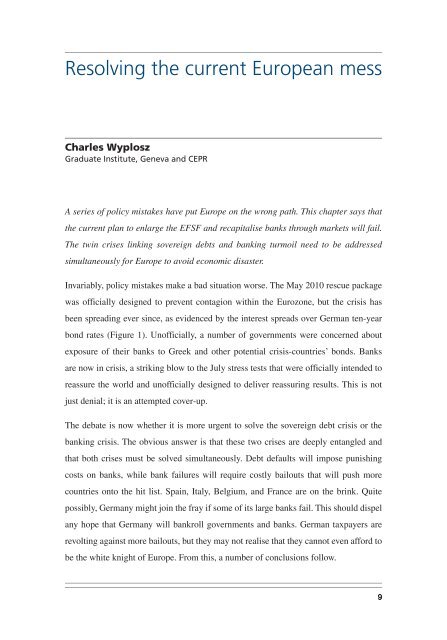You also want an ePaper? Increase the reach of your titles
YUMPU automatically turns print PDFs into web optimized ePapers that Google loves.
Resolving the current European mess<br />
Charles Wyplosz<br />
Graduate Institute, Geneva and CEPR<br />
A series of policy mistakes have put Europe on the wrong path. This chapter says that<br />
the current plan to enlarge the EFSF and recapitalise banks through markets will fail.<br />
The twin crises linking sovereign debts and banking turmoil need to be addressed<br />
simultaneously for Europe to avoid economic disaster.<br />
Invariably, policy mistakes make a bad situation worse. The May 2010 rescue package<br />
was officially designed to prevent contagion within the Eurozone, but the crisis has<br />
been spreading ever since, as evidenced <strong>by</strong> the interest spreads over German ten-year<br />
bond rates (Figure 1). Unofficially, a number of governments were concerned about<br />
exposure of their banks to Greek and other potential crisis-countries’ bonds. Banks<br />
are now in crisis, a striking blow to the July stress tests that were officially intended to<br />
reassure the world and unofficially designed to deliver reassuring results. This is not<br />
just denial; it is an attempted cover-up.<br />
The debate is now whether it is more urgent to solve the sovereign debt crisis or the<br />
banking crisis. The obvious answer is that these two crises are deeply entangled and<br />
that both crises must be solved simultaneously. Debt defaults will impose punishing<br />
costs on banks, while bank failures will require costly bailouts that will push more<br />
countries onto the hit list. Spain, Italy, Belgium, and France are on the brink. Quite<br />
possibly, Germany might join the fray if some of its large banks fail. This should dispel<br />
any hope that Germany will bankroll governments and banks. German taxpayers are<br />
revolting against more bailouts, but they may not realise that they cannot even afford to<br />
be the white knight of Europe. From this, a number of conclusions follow.<br />
9














